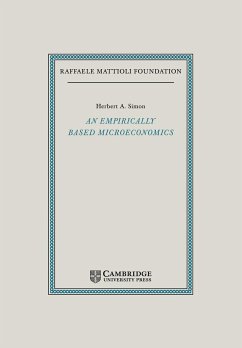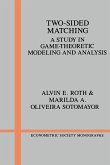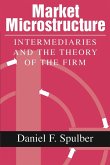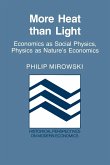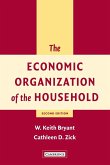- Broschiertes Buch
- Merkliste
- Auf die Merkliste
- Bewerten Bewerten
- Teilen
- Produkt teilen
- Produkterinnerung
- Produkterinnerung
Best-selling author and Nobel Laureate, Professor Herbert Simon traces the development and future of microeconomics.
Andere Kunden interessierten sich auch für
![Two-Sided Matching Two-Sided Matching]() Alvin E. RothTwo-Sided Matching43,99 €
Alvin E. RothTwo-Sided Matching43,99 €![Market Microstructure Market Microstructure]() Daniel F. SpulberMarket Microstructure62,99 €
Daniel F. SpulberMarket Microstructure62,99 €![More Heat Than Light More Heat Than Light]() Philip J. MirowskiMore Heat Than Light63,99 €
Philip J. MirowskiMore Heat Than Light63,99 €![The Economic Organization of the Household The Economic Organization of the Household]() W. Keith BryantThe Economic Organization of the Household60,99 €
W. Keith BryantThe Economic Organization of the Household60,99 €![The Collected Writings of John Maynard Keynes The Collected Writings of John Maynard Keynes]() John Maynard KeynesThe Collected Writings of John Maynard Keynes42,99 €
John Maynard KeynesThe Collected Writings of John Maynard Keynes42,99 €![The Collected Writings of John Maynard Keynes The Collected Writings of John Maynard Keynes]() John Maynard KeynesThe Collected Writings of John Maynard Keynes44,99 €
John Maynard KeynesThe Collected Writings of John Maynard Keynes44,99 €![The Collected Writings of John Maynard Keynes The Collected Writings of John Maynard Keynes]() John Maynard KeynesThe Collected Writings of John Maynard Keynes29,99 €
John Maynard KeynesThe Collected Writings of John Maynard Keynes29,99 €-
-
-
Best-selling author and Nobel Laureate, Professor Herbert Simon traces the development and future of microeconomics.
Hinweis: Dieser Artikel kann nur an eine deutsche Lieferadresse ausgeliefert werden.
Hinweis: Dieser Artikel kann nur an eine deutsche Lieferadresse ausgeliefert werden.
Produktdetails
- Produktdetails
- Verlag: Cambridge University Press
- Seitenzahl: 236
- Erscheinungstermin: 11. Mai 2009
- Englisch
- Abmessung: 244mm x 170mm x 13mm
- Gewicht: 415g
- ISBN-13: 9780521118361
- ISBN-10: 0521118360
- Artikelnr.: 27007810
- Herstellerkennzeichnung
- Libri GmbH
- Europaallee 1
- 36244 Bad Hersfeld
- gpsr@libri.de
- Verlag: Cambridge University Press
- Seitenzahl: 236
- Erscheinungstermin: 11. Mai 2009
- Englisch
- Abmessung: 244mm x 170mm x 13mm
- Gewicht: 415g
- ISBN-13: 9780521118361
- ISBN-10: 0521118360
- Artikelnr.: 27007810
- Herstellerkennzeichnung
- Libri GmbH
- Europaallee 1
- 36244 Bad Hersfeld
- gpsr@libri.de
Preface
First lecture: rationality in decision making: 1.1. Development of the concept of rationality
1.2. Contemporary choice theory
1.3. The plurality of rationalities
1.4. The history reviewed
1.5. Empirical tests of theories
1.6. References
1.7. Debate of the first lecture Andrea Ichino, Luigi Pasinetti
Second lecture: the role of organisations in an economy: 2.1. Organisations and markets
2.2. Altruism and organisational identification
2.3. Organization, management and the economy
2.4. Conclusion
2.5. References
2.6. Debate of the second lecture
Third lecture: empirical evidence for economics: 3.1. How much theory, and how concrete
3.2. Implications of data for theory
3.3.The sources of data on economic processes
3.4. Seeking empirical data outside the business firm
3.5. Decision making in the business firm: case studies
3.6. Economic history
3.7. Data from 'applied' economics
3.8. Survey techniques
3.9. Conclusion
3.10. References
3.11. Debate of the third lecture Fabio Arcangeli, Anna Grandori, Andrea Ichino, Daniele Terlizze
Comments: Claudio Dematte, Massimo Egidi, Robert Marris, Aldo Montesano, Riccardo Viale
Simon's reply
Herbert A. Simon's autobiographical sketch.
First lecture: rationality in decision making: 1.1. Development of the concept of rationality
1.2. Contemporary choice theory
1.3. The plurality of rationalities
1.4. The history reviewed
1.5. Empirical tests of theories
1.6. References
1.7. Debate of the first lecture Andrea Ichino, Luigi Pasinetti
Second lecture: the role of organisations in an economy: 2.1. Organisations and markets
2.2. Altruism and organisational identification
2.3. Organization, management and the economy
2.4. Conclusion
2.5. References
2.6. Debate of the second lecture
Third lecture: empirical evidence for economics: 3.1. How much theory, and how concrete
3.2. Implications of data for theory
3.3.The sources of data on economic processes
3.4. Seeking empirical data outside the business firm
3.5. Decision making in the business firm: case studies
3.6. Economic history
3.7. Data from 'applied' economics
3.8. Survey techniques
3.9. Conclusion
3.10. References
3.11. Debate of the third lecture Fabio Arcangeli, Anna Grandori, Andrea Ichino, Daniele Terlizze
Comments: Claudio Dematte, Massimo Egidi, Robert Marris, Aldo Montesano, Riccardo Viale
Simon's reply
Herbert A. Simon's autobiographical sketch.
Preface
First lecture: rationality in decision making: 1.1. Development of the concept of rationality
1.2. Contemporary choice theory
1.3. The plurality of rationalities
1.4. The history reviewed
1.5. Empirical tests of theories
1.6. References
1.7. Debate of the first lecture Andrea Ichino, Luigi Pasinetti
Second lecture: the role of organisations in an economy: 2.1. Organisations and markets
2.2. Altruism and organisational identification
2.3. Organization, management and the economy
2.4. Conclusion
2.5. References
2.6. Debate of the second lecture
Third lecture: empirical evidence for economics: 3.1. How much theory, and how concrete
3.2. Implications of data for theory
3.3.The sources of data on economic processes
3.4. Seeking empirical data outside the business firm
3.5. Decision making in the business firm: case studies
3.6. Economic history
3.7. Data from 'applied' economics
3.8. Survey techniques
3.9. Conclusion
3.10. References
3.11. Debate of the third lecture Fabio Arcangeli, Anna Grandori, Andrea Ichino, Daniele Terlizze
Comments: Claudio Dematte, Massimo Egidi, Robert Marris, Aldo Montesano, Riccardo Viale
Simon's reply
Herbert A. Simon's autobiographical sketch.
First lecture: rationality in decision making: 1.1. Development of the concept of rationality
1.2. Contemporary choice theory
1.3. The plurality of rationalities
1.4. The history reviewed
1.5. Empirical tests of theories
1.6. References
1.7. Debate of the first lecture Andrea Ichino, Luigi Pasinetti
Second lecture: the role of organisations in an economy: 2.1. Organisations and markets
2.2. Altruism and organisational identification
2.3. Organization, management and the economy
2.4. Conclusion
2.5. References
2.6. Debate of the second lecture
Third lecture: empirical evidence for economics: 3.1. How much theory, and how concrete
3.2. Implications of data for theory
3.3.The sources of data on economic processes
3.4. Seeking empirical data outside the business firm
3.5. Decision making in the business firm: case studies
3.6. Economic history
3.7. Data from 'applied' economics
3.8. Survey techniques
3.9. Conclusion
3.10. References
3.11. Debate of the third lecture Fabio Arcangeli, Anna Grandori, Andrea Ichino, Daniele Terlizze
Comments: Claudio Dematte, Massimo Egidi, Robert Marris, Aldo Montesano, Riccardo Viale
Simon's reply
Herbert A. Simon's autobiographical sketch.

